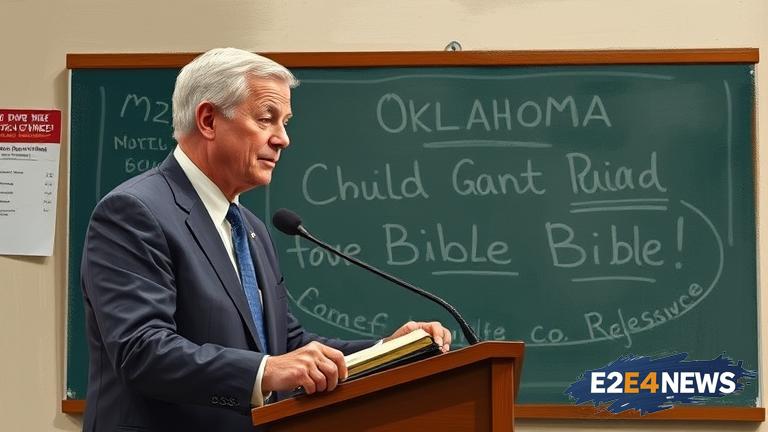In a recent development, Oklahoma Governor Kevin Stitt and Superintendent of Public Instruction Ryan Walters have asked the Oklahoma Supreme Court to lift a stay on a lawsuit that has been blocking the state’s plan to purchase classroom Bibles. The lawsuit, which was filed by a group of parents and educators, challenges the constitutionality of the state’s plan to provide Bibles to public school students. The plaintiffs argue that the plan violates the separation of church and state, as well as the Establishment Clause of the First Amendment. However, Governor Stitt and Superintendent Walters claim that the Bibles are for educational purposes only and do not promote any particular religion. They argue that the stay on the lawsuit is causing unnecessary delays and preventing the state from moving forward with its plan. The state’s plan to purchase classroom Bibles has been a topic of controversy, with many arguing that it is an attempt to promote Christianity in public schools. Others argue that the Bibles are a valuable educational resource that can help students learn about history, literature, and culture. The Oklahoma Supreme Court will now consider the motion to lift the stay, and a decision is expected in the coming weeks. If the stay is lifted, the state will be able to proceed with its plan to purchase the Bibles, but the lawsuit will still be ongoing. The outcome of the lawsuit will have significant implications for the state’s education system and the role of religion in public schools. The case has also sparked a wider debate about the separation of church and state, and the limits of religious expression in public institutions. Many are watching the case closely, as it has the potential to set a precedent for other states and school districts. The use of Bibles in public schools is not a new issue, but the Oklahoma case has brought it back into the spotlight. The state’s plan to purchase classroom Bibles is part of a larger effort to promote biblical literacy and education. However, critics argue that the plan is misguided and that the state should focus on more pressing educational issues. The Oklahoma Supreme Court’s decision will be closely watched, as it will have significant implications for the state’s education system and the role of religion in public schools. The case is also likely to spark further debate and controversy, as it raises important questions about the separation of church and state and the limits of religious expression in public institutions. Ultimately, the outcome of the case will depend on the Oklahoma Supreme Court’s interpretation of the law and the Constitution. The court will need to carefully consider the arguments presented by both sides and make a decision that balances the competing interests and values at stake. The decision will also have implications for other states and school districts, as it will provide guidance on the use of religious texts in public schools. As the case moves forward, it is likely to continue to generate significant attention and debate, both in Oklahoma and nationally.
